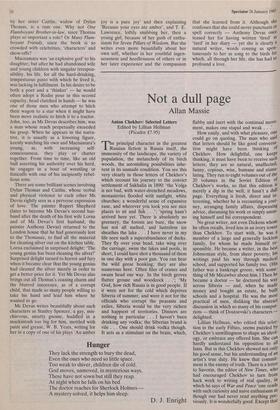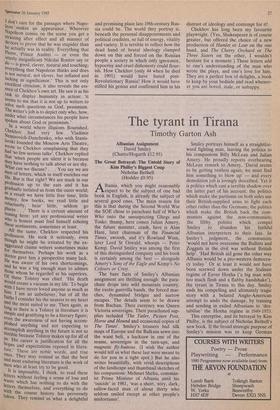Not a dull page
Allan Massie
Anton Chekhov: Selected Letters Edited by Lillian Hellman (Picador £7.95)
The principal character in the greatest Russian fiction is Russia itself, the immensity of the landscape, the variety of population, the melancholy of its birch woods, the astonishing possibilities inhe- rent in its unmade condition. You see this very clearly in those letters of Chekhov's which recount his journey to the convict settlement of Sakhalin in 1890: 'the Volga is not bad, with water-drenched meadows, monasteries flooded with sunlight, white churches; a wonderful sense of expansive ease, and wherever you look you see nice places to sit and fish . . .'; 'spring hasn't arrived here yet. There is absolutely no greenery, the forests are bare, the snow has not all melted, and lustreless ice sheathes the lake . . . I have never in my life seen such a superabundance of ducks. They fly over your head, take wing over the carriage, swim the lakes and pools, in short, I could have shot a thousand of them in one day with a poor gun. You can hear the wild geese honking; they are also numerous here. Often files of cranes and swans head our way. In the birch groves flutter grouse and woodcock . . .'; 'My God, how rich Russia is in good people. If it were not for the cold which deprives Siberia of summer, and were it not for the officials who corrupt the peasants and exiles, Siberia would be the very richest and happiest of territories. Dinners are nothing in particular . . . I haven't been drinking any vodka; the Siberian brand is vile . . . One should drink vodka though. It acts as a stimulant on the brain, which, flabby and inert with the continual move- ment, makes one stupid and weak . .
How easily, and with what pleasure, one could go on quoting. The man who said that letters should be like good conversa- tion might have been thinking of Chekhov. How delightful, one keeps thinking, it must have been to receive such letters; they are so natural, unaffected, funny, copious, wise, humane and stimu- lating. They run to eight volumes out of the 20 volumes in the Soviet Edition of Chekhov's works, so that this edition is merely a dip in the well; it hasn't a dull page. Everything is fresh, direct and in- teresting, whether he is recounting a jour- ney, arranging family affairs, dispensing advice, discussing his work or simply amus- ing himself and his correspondent.
No great writer, not even Dickens who'll he often recalls, lived less in an ivory tower than Chekhov. To start with, he was a member of a large and generally feckless family, for whom he made himself re- sponsible. He became a writer, in the best Johnsonian style, from sheer poverty; his writings paid his way through medical school, and supported his family too. (His father was a bankrupt grocer, with some' thing of Mr Micawber about him.) Then he became a doctor — he doctored his waY across Siberia — and, when he made money and bought an estate, he built schools and a hospital. He was the most practical of men, disliking the abstract discussion in which so many of his compat- riots — think of Dostoevski's characters --- delighted.
Lillian Hellman, who edited this selec- tion in the early Fifties, seems puzzled by Chekhov's unwillingness to shape an ideol- ogy, or embrace any offered him. She can hardly understand his opposition to all Isms. But in this Chekhov showed not only his good sense, but his understanding of an artist's true duty. He knew that commit- ment is the enemy of truth. There is a letter to Suvorin, the editor of New Times, who had encouraged Chekhov to turn from hack work to writing of real quality, in which he says of War and Peace 'one reads with such curiosity and naive enthusiasm as though one had never read anything pre- viously. It is wonderfully good. Except that
I don't care for the passages where Napo- leon makes an appearance. Wherever Napoleon comes on the scene you get a straining after effect and all manner of devices to prove that he was stupider than he actually was in reality. Everything that Pierre, Prince Andrei — or even the utterly insignificant Nikolai Rostov say or do — is good, clever, natural and touching; everything that Napoleon thinks and does is not natural, not clever, but inflated and lacking in significance.' This is not only excellent criticism; it also reveals the ess- ence of Chekhov's own art. He saw it as his task to display humanity in action: 'it seems to me that it is not up to writers to solve such questions as God, pessimism. The writer's job is to depict only who, how, under what circumstances his people have spoken about God or pessimism.' In a world where illusions flourished, Chekhov had very few. Vladimir
Nemirovich-Danchenko, who with Stanis-
layski founded the Moscow Arts Theatre, wrote to Chekhov complaining that they had 'so few serious talks'. Chekhov replied that 'when people are silent it is because they have nothing to talk about or are shy. What can we discuss? . . . You say we are men of letters, which in itself enriches our life. But is that right? We are stuck in our Profession up to the ears and it has gradually isolated us from the outer world; as a result we have little free time, little money, few books, we read little and
reluctantly, hear little, seldom go places . . .' There is a certain amount of
teasing here; yet any professional writer Who is honest must find himself echoing these sentiments, sometimes at least. All the same, Chekhov respected his profession. He took it seriously, even though he might be irritated by the ex- aggerated claims writers sometimes make for themselves. Perhaps his work as a doctor gave him a perspective many lack.
He was aware of his own shortcomings, and he was a big enough man to admire
those whom he regarded as his superiors. Of these Tolstoy was chief. 'His death Would create a vacuum in my life. To begin with I have never loved anyone as much as !tun: I am an unbeliever, but of all the faiths I consider his the nearest to my heart and the most suited to me. Then again, as ng as there is a Tolstoy in literature it is simple and gratifying to be a literary figure; even the awareness of not having accom-
plished anything and not expecting to accomplish anything in the future is not so
terrible because Tolstoy makes up for all of
Its. His career is justification for all the hopes and expectations reposed in litera-
ture.' These are noble words, and true ones. They may remind us that the best and most enduring literature is the work of men who at least try to be good. It is impossible, I think, to read these letters without feeling a sense of loss and Waste which has nothing to do with the letters themselves, and everything to do with the course history has perversely taken. They remind us what a delightful and promising place late 19th-century Rus- sia could be. The world they portray is, beneath the personal disappointments and political crudities, so full of energy, vitality and variety. It is terrible to reflect how the dead hand of brutal ideology clamped down on this and forced on the Russian people a society in which only ignorance, hypocrisy and cruel dishonesty could flour- ish. How Chekhov (only 44 when he died in 1901) would have hated post- Revolutionary Russia! How it would have stifled his genius and confirmed him in his distrust of ideology and contempt for it!
Chekhov has long been my favourite playwright. (Yes, Shakespeare is of course greater, but offered the choice of a new production of Hamlet or Lear on the one hand, and The Cherry Orchard or The Three Sisters on the other, I wouldn't hesitate for a moment.) These letters add to one's understanding of the man who wrote the plays, and one's love for him. They are a perfect box of delights, a book to keep by your bedside and read whenev- er you are bored, stale, or unhappy.











































 Previous page
Previous page